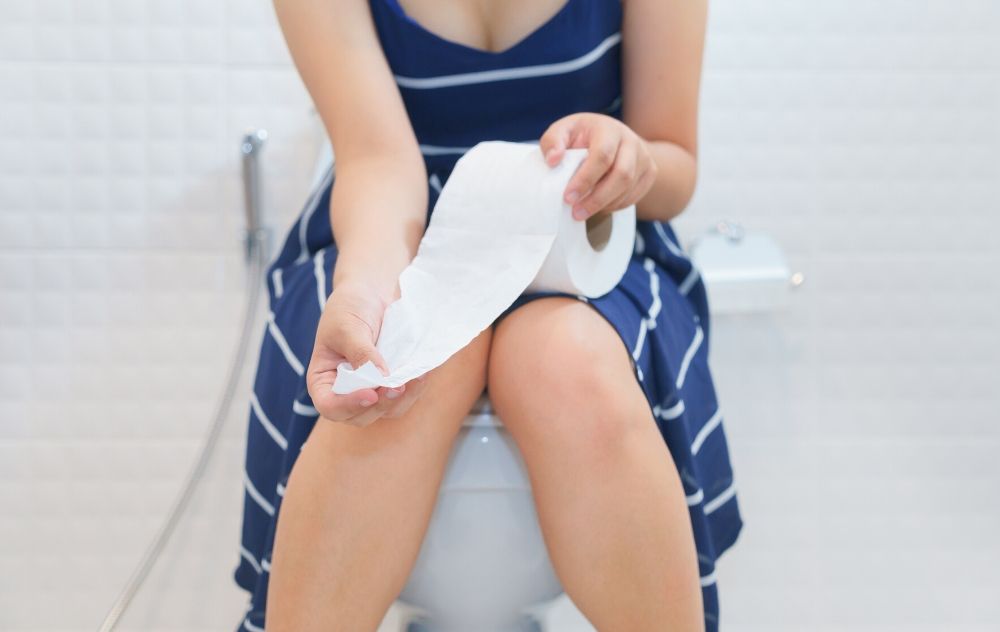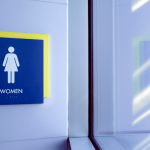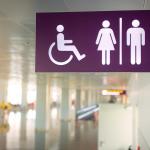
Topics Covered in this blog
- What is a UTI?
- Fibroids and Uterine Infections
- Fibroids vs UTI Symptoms
- Frequent Urination
- Causes of Uterine Infections
- Don’t Be Confused With Endometriosis
- Can fibroids cause yeast infections?
- Uterine Fibroid Treatment Options
- Visit USA Fibroid Centers Today for Treatment
You may wonder, “Can fibroids cause Urinary Tract Infections (UFIs)?” Despite the lack of information on the topic, the simple answer is yes, possibly. Due to the fact that UTIs are commonly caused by holding your urine for prolonged periods or not fully emptying your bladder; for women living with uterine fibroids, UTIs could be a common recurrence. If your fibroids grow to be large or if they develop in certain spots, they could expand the uterus. An enlarged uterus can put pressure on the area where the bladder is connected to the urethra. This can lead to difficulty fully emptying the bladder.
There are few studies regarding women with fibroids having an increased risk of uterine fibroids; however, it is best to consult with a fibroid specialist if you are worried about a UTI.
In addition, if you have an expanded uterus caused by fibroids, it may become difficult to differentiate between fibroid symptoms and the symptoms of a UTI. If you’re already experiencing frequent urination, a UTI could go undetected. It’s important to understand the other symptoms of a UTI so you can notify a doctor if you think you may have one. You can use our symptom checker to find out if you have some of the symptoms that come with fibroids.
Check our symptom checker
What is a UTI?
A urinary tract infection (UTI) is an infection found somewhere in the urinary tract. This system includes the kidneys, bladder, urethra, and ureters. Most UTIs are found in the bladder or urethra.
Women are more susceptible to UTIs than men, but they can usually be treated with antibiotics for faster recovery. Depending on where the fibroid is located, it can cause symptoms similar to uterine fibroids. You may experience pain in the back, pressure in the pelvic area or discomfort in the lower abdomen, and frequent urination. Other symptoms you may experience include fever, nausea,vomiting, shaking and chills, and painful urination.
Fibroids and Uterine Infections
Fibroids can lead to uterine infections, especially as they get bigger. As a fibroid grows, it can press on the bladder. The fibroid can put pressure on the bladder, making it difficult to empty even when you have an intense feeling to urinate. When the bladder can’t empty completely, it can lead to infections.
Pelvic Pain
Both fibroids and UTIs can cause pain in the pelvic area. Sometimes, it can be difficult to determine which condition is causing the pain. If the UTI is in your kidneys, you may experience pain in the back or along the side rather than in the pelvis. If the infection is in the bladder, you may feel pressure in your pelvis and lower abdomen.
If you have uterine fibroids, you may notice pressure in your lower stomach or an uncomfortable feeling. As the fibroid grows, it can lead to the appearance of bloating or pregnancy while pressing on other organs.
In some cases, you may have acute pain in the abdomen. This most often happens with a pedunculated fibroid, which is attached to the uterus by a thin stalk. If the stalk gets twisted, it cuts off the blood supply, which can cause more severe pain.

Fibroids vs. UTI Symptoms
One of the most common symptoms of uterine fibroids, benign growths in the uterus, is frequent urination or difficulty emptying the bladder. This happens when fibroids grow large, expanding the uterus which puts pressure on other organs like the bladder or urethra. But how can you know if your frequent urination is being caused by a UTI or uterine fibroid? Fibroids and UTI symptoms may be somewhat similar, that’s why it’s crucial to think about the other symptoms you may be experiencing.
If you are also struggling with:
- A heavy period lasting more than 10 days per month
- Pelvic pain or severe cramping
- Pain during sex
- Frequent urination or difficulty emptying the bladder
- Fatigued caused by anemia
- Bleeding between periods
- Protruding abdomen or belly area
Then you may be experiencing the symptoms of uterine fibroids. Even if you’re not experiencing all or any of these above symptoms, it’s important to consult a fibroid specialist to get a comprehensive evaluation.
In contrast, the symptoms of a urinary tract infection include:
- A burning sensation when urinating
- Frequent urination or difficulty emptying the bladder
- Feeling tired or shaky
- Cloudy color or small amounts of blood in your urine
- Pain or pressure in your back or lower abdomen
- Fever or chills
Although fibroids and UTI symptoms may seem quite similar, uterine fibroids typically have an impact on your period where a UTI does not. Both can be diagnosed with a pelvic exam by a physician.
Health Tip: Use a period tracking app that allows you to input other symptoms like fatigue, pelvic pain, and frequent urination. These can help you learn more about your period and understand what is normal for you and what is not.
Frequent Urination
Frequent urination is characterized as the need to urinate more than you normally would. You know your body pretty well; therefore, if you are running to the restroom more frequently than you normally would it probably has an underlying cause. This urge can strike suddenly and can cause you to lose control of your bladder. It may also lead to the uncomfortable feeling of your bladder being full when it is not.
By many urologists, urination is considered “frequent” when you are going more than eight times in a 24-hour time period.

Why do UTIs cause frequent urination?
If bacteria grows in the kidneys, bladder, or urethra, this can cause a UTI. Bacteria irritates and can cause the bladder, kidneys, and urethra to become inflamed depending on how long you’ve had the UTI. If you’re wondering what can cause a urinary tract infection, then you may want to look at some of your habits. UTIs develop through many different lifestyle factors such as:
- Any condition that makes it difficult to fully empty your bladder
- Sexual activity that brings bacteria into the urinary tract
- Not drinking enough water
- Immune system suppression such as diabetes
- Menopause or pregnancy can alter your body’s pH levels and vaginal flora
- A condition that suppresses your immune system
- Not practicing proper hygiene when using the restroom
- Wearing tight-fitting clothing or clothing that does not allow for sweat to be wicked away

Urinary tract infections are usually characterized as being either lower tract, when it only impacts your bladder or urethra, or upper tract if it involves your kidneys as well. Upper tract UTIs are rarer and more severe than lower tract ones. In only a few, rare cases UTIs could be caused by fungi or viruses as well. These different kinds of UTIs can become severe if left untreated; therefore, it’s critical to get them treated as quickly as possible.
What other uterine conditions cause urinary urgency?
UTIs and uterine fibroids are not the only two conditions or diseases that may lead to frequent urination or the urgency to urinate. Others that you should be aware of and talk to your doctor about include:
- Mental conditions such as depression or anxiety
- If you take any medications that act as a diuretic
- Food and drinks that act as diuretics such as caffeine or alcohol
- Stroke and other nervous system conditions like neuropathy
- Interstitial cystitis, a type of inflammation of the bladder wall
- Overactive bladder (OAB) syndrome, which causes involuntary bladder contractions
- Kidney stones
- Certain kinds of cancer treatments
- Sexually transmitted diseases (STIs)
It’s always good to be aware of different aspects that may influence your bladder’s regularity. If you think you have any of the above, see your primary physician immediately. Many of these conditions are treatable if diagnosed early on. Annual women’s health exams can help detect UTIs, STDs or STIs, uterine fibroids, endometriosis, and other uterine diseases.
Sign up for our newsletter

Causes of Uterine Infections
You should not mistake a uterine infection with fibroids or a UTI. However, misplaced bacteria that finds its way and harbors in the uterus is a common cause of both a UTI and a uterine infection. A uterine infection could be caused by any of the following:
- Sexually transmitted disease
- Miscarriage
- Childbirth
- Abortion or dilation and curettage
- Placement of an IUD
- Hysteroscopy
Endometritis should not be confused with endometriosis. Endometritis includes fever, abdominal pain, and abnormal vaginal bleeding. As we’ve mentioned before, self-diagnosing can become difficult with endometritis, fibroids and UTI symptoms share some of the same qualities. Talk to a medical professional before attempting any treatment solutions on your own.
As you can see, many women’s health conditions have similar symptoms making it difficult to self-diagnose. A women’s health specialist, primary physician, or fibroid specialist can evaluate your individual situation and suggest the right treatment for you.
Don’t Confuse UTI with Endometriosis
Endometriosis can add to the confusion of diagnosing conditions affecting the lower abdomen and urinary tract. This condition occurs when the inner lining of the uterus starts growing outside the uterus.
Endometriosis can also cause pain in the pelvic area and severe cramping. It can lead to pain during urination as well. This pain often occurs around your period. It can be difficult to know what is causing your discomfort without a medical diagnosis because the conditions show similar symptoms.

Can Fibroids Cause Yeast Infections?
Fibroids don’t technically cause yeast infections — and the two conditions are unrelated. However, you may be at a higher risk for a yeast infection if you have fibroids that cause prolonged or heavy periods. The risk of developing a yeast infection may increase if you wear sanitary pads daily. The longer you must wear these products, the greater your risk of developing a yeast infection.
Uterine Fibroid Treatment Options
If you’re tired of running to the bathroom, struggling through heavy, painful periods, or worried about developing iron-deficiency anemia, then treating your fibroids could be an effective way to manage these painful symptoms and get back to your normal routine.
Many doctors recommend a hysterectomy to treat fibroids. Since it results in the removal of the uterus, it completely eliminates the potential for fibroid growth. However, it is important to note that a hysterectomy causes infertility.
A myomectomy is another surgical option which removes fibroids without removing the uterus. This procedure can cause future issues with childbirth with an increased risk for complications during delivery and throughout the pregnancy.
Nonsurgical, office-based treatments like Uterine Fibroid Embolization (UFE) can eliminate frequent urination or difficulty emptying the bladder by reducing the size of your fibroids. Once your fibroids have been shrunk, your uterus will return to its normal size, thus relieving pressure off your bladder and urethra.
Whether you’ve been diagnosed with uterine fibroids or are in need of an evaluation, you know that finding the right treatment, doctor, and center that fits your individual needs is a top priority. Explore our website to learn more about Uterine Fibroid Embolization, as well as our physicians, locations, and insurance coverage.

Visit USA Fibroid Centers Today for Treatment
You have the power to choose your next steps. Schedule a no-pressure, first evaluation with one of our experienced fibroid specialists by calling 855.615.2555 or clicking the button below.




